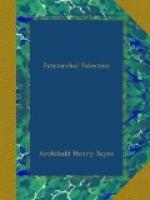Outside the pages of the Old Testament the special form assumed by the blessing has been found only in the Aramaic inscriptions of Egypt. Here too we find travellers from Palestine writing of themselves “Blessed be Augah of Isis,” or “Blessed be Abed-Nebo of Khnum”! It would seem, therefore, to have been a formula peculiar to Canaan; at all events, it has not been traced to other parts of the Semitic world. The temple of the Most High God—El Elyon—probably stood on Mount Moriah where the temple of the God of Israel was afterwards to be erected. It will be remembered that among the letters sent by Ebed-Tob, the king of Jerusalem, to the Egyptian Pharaoh is one in which he speaks of “the city of the Mountain of Jerusalem, whose name is the city of the temple of the god Nin-ip.” In this “Mountain of Jerusalem” it is difficult not to see the “temple-Mount” of later days.
In the cuneiform texts of Ebed-Tob and the later Assyrian kings the name of Jerusalem is written Uru-Salim, “the city of Salim.” Salim or “Peace” is almost certainly the native name of the god who was identified with the Babylonian Nin-ip, and perhaps Isaiah—that student of the older history of his country—is alluding to the fact when he declares that one of the titles of the Messiah shall be “the Prince of Peace.” At any rate, if the Most High God of Jerusalem were really Salim, the God of Peace, we should have an explanation of the blessing pronounced by Melchizedek upon the patriarch. Abram’s victory had restored peace to Canaan; he had brought back the captives, and had himself returned in peace. It was fitting, therefore, that he should be welcomed by the priest of the God of Peace, and that he should offer tithes of the booty he had recovered to the god of “the City of Peace.”
This offering of tithes was no new thing. In his Babylonian home Abraham must have been familiar with the practice. The cuneiform inscriptions of Babylonia contain frequent references to it. It went back to the pre-Semitic age of Chaldaea, and the great temples of Babylonia were largely supported by the esra or tithe which was levied upon prince and peasant alike. That the god should receive a tenth of the good things which, it was believed, he had bestowed upon mankind, was not considered to be asking too much. There are many tablets in the British Museum which are receipts for the payment




